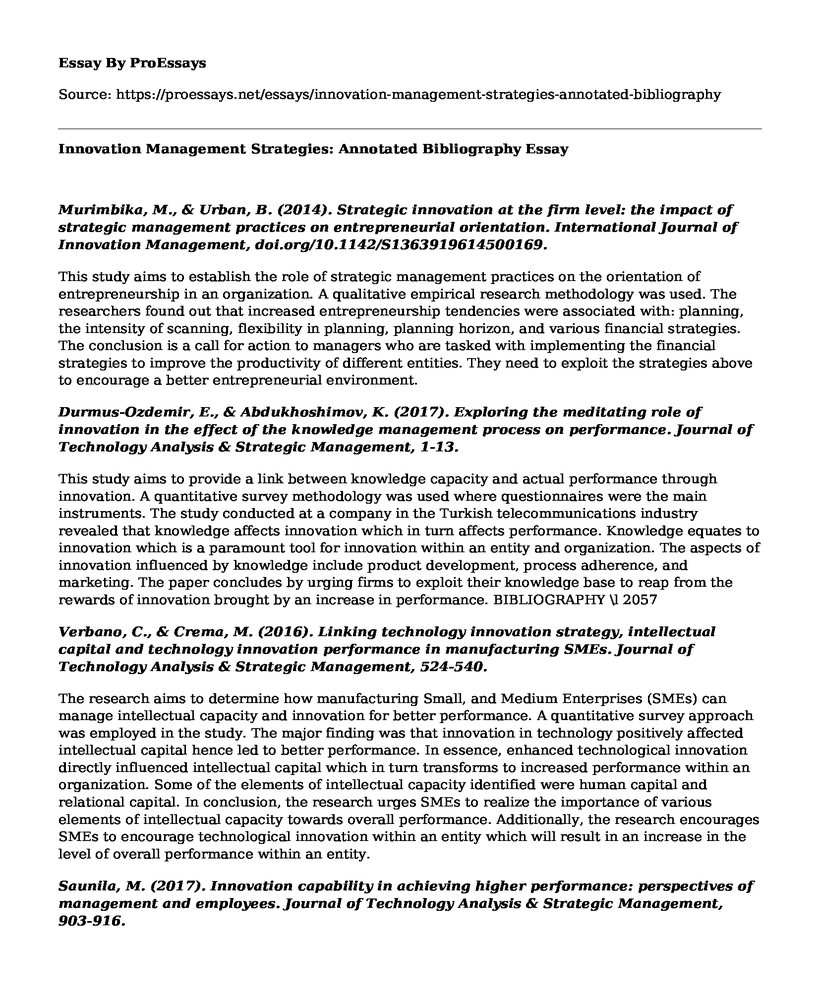Murimbika, M., & Urban, B. (2014). Strategic innovation at the firm level: the impact of strategic management practices on entrepreneurial orientation. International Journal of Innovation Management, doi.org/10.1142/S1363919614500169.
This study aims to establish the role of strategic management practices on the orientation of entrepreneurship in an organization. A qualitative empirical research methodology was used. The researchers found out that increased entrepreneurship tendencies were associated with: planning, the intensity of scanning, flexibility in planning, planning horizon, and various financial strategies. The conclusion is a call for action to managers who are tasked with implementing the financial strategies to improve the productivity of different entities. They need to exploit the strategies above to encourage a better entrepreneurial environment.
Durmus-Ozdemir, E., & Abdukhoshimov, K. (2017). Exploring the meditating role of innovation in the effect of the knowledge management process on performance. Journal of Technology Analysis & Strategic Management, 1-13.
This study aims to provide a link between knowledge capacity and actual performance through innovation. A quantitative survey methodology was used where questionnaires were the main instruments. The study conducted at a company in the Turkish telecommunications industry revealed that knowledge affects innovation which in turn affects performance. Knowledge equates to innovation which is a paramount tool for innovation within an entity and organization. The aspects of innovation influenced by knowledge include product development, process adherence, and marketing. The paper concludes by urging firms to exploit their knowledge base to reap from the rewards of innovation brought by an increase in performance. BIBLIOGRAPHY \l 2057
Verbano, C., & Crema, M. (2016). Linking technology innovation strategy, intellectual capital and technology innovation performance in manufacturing SMEs. Journal of Technology Analysis & Strategic Management, 524-540.
The research aims to determine how manufacturing Small, and Medium Enterprises (SMEs) can manage intellectual capacity and innovation for better performance. A quantitative survey approach was employed in the study. The major finding was that innovation in technology positively affected intellectual capital hence led to better performance. In essence, enhanced technological innovation directly influenced intellectual capital which in turn transforms to increased performance within an organization. Some of the elements of intellectual capacity identified were human capital and relational capital. In conclusion, the research urges SMEs to realize the importance of various elements of intellectual capacity towards overall performance. Additionally, the research encourages SMEs to encourage technological innovation within an entity which will result in an increase in the level of overall performance within an entity.
Saunila, M. (2017). Innovation capability in achieving higher performance: perspectives of management and employees. Journal of Technology Analysis & Strategic Management, 903-916.
The purpose of this study is to find out the correlation between innovation capacity and company performance. The research methodology used was a qualitative survey that involved getting the opinions of the management and staff via the website. The findings of the survey were that the capacity to innovate affected performance via three factors: organization of structures and ideas, team-based leadership, and know-how development. It was noted that the staff offered different perspectives to the management regarding the factors that influenced organizational performance. To conclude, the researchers noted the need to harmonize the perspectives of the management and employees. Unification of the two results in an increase in productivity and performance within a particular system.
Arshi, T., & Chugh, G. (2013). Strategizing for Innovation: An Empirical Investigation on Strategic Orientation and Innovation Types. Business and Management Horizons, 138.
The purpose of this research is first to identify the issues facing strategic innovation in organizations. Second, is to outline specific directions that an organization should take for strategic innovation. A qualitative empirical research methodology was used for this study. The critical finding discovered was that there are various levels of innovation and each type is achieved by a specific strategy. The research then concluded with a reminder to organizations that innovation is not a blanket application. It should be tailored to suit the specific needs of an organization. Also, there should be strict adherence to the different strategies in an entity to fully realize the ability to innovate within an organization.
Cite this page
Innovation Management Strategies: Annotated Bibliography. (2022, Apr 07). Retrieved from https://proessays.net/essays/innovation-management-strategies-annotated-bibliography
If you are the original author of this essay and no longer wish to have it published on the ProEssays website, please click below to request its removal:
- Fred Hampton: I Am a Revolutionary
- Tool Creation, Visitation, and Analysis of an Organization Paper Example
- Research Paper on Conscientiousness and Agreeableness Personality Traits on Nursing Leadership
- Essay Example on Anger Derails Leadership: 5 Discoveries & Ways to Control It
- Leaders Need to Articulate a Vision: 3 Reasons Why - Essay Sample
- Free Report Example on Rehab Services: Peterson Health Care's Mission
- Essay Sample: Exploring Ethical Dimensions in Technical Communication and Workplace Leadership







